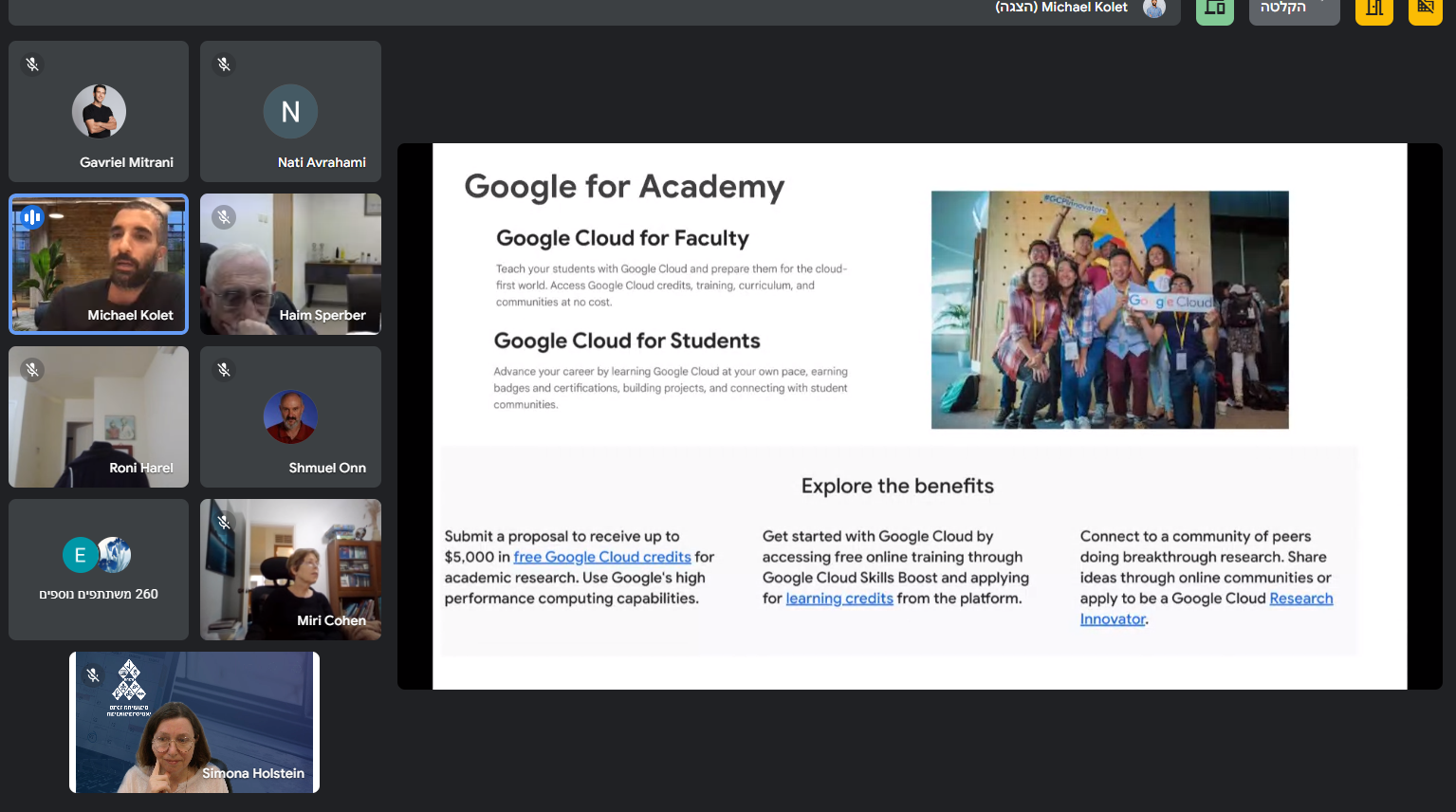
As part of the IUCC’s efforts to promote AI tools and technologies for researchers, IUCC is hosting a series of webinars in cooperation with AI4RI and SELA on Innovations in GenAI and ML.
The first in the series took place on January 9 in collaboration with Google. Over 270 attended contributing to lively discussions. The feedback was very positive and participants requested further webinars and practical workshops on the subjects.
The webinar covered many topics. The following summary and links offer details and sources for further reference.
Google offers a cloud environment with many infrastructure and platforms as a service capabilities, including GenAI, parallel computing and HPC, AI/ML services and many more.
The advantages include advanced technology available for easy and quick adoption, smart and efficient use of resources, pay-as-you-go cost savings.
Users can start and test Google’s cloud services in a simple and immediate way. Through IUCC you can get a private and secure environment, with favorable as part of the Nimbus framework, including large discounts.
Universities make payment to IUCC, and IUCC in turn remits payments to Google. Accounts can be opened using a form on the IUCC website.
Enterprise GenAI – Google offers a variety of creative models, from Google and others, that provides a secure and completely private environment.
On the Generative AI website on Google Cloud website you can read about Model Garden, Generative AI Studio and the most advanced Gemini model tools.
This video presents Unlocking insights in Scientific Literature webinar in detail.
Updates in the is field are constant and new models that are now available in the cloud. Each model is suitable for a different use case.
That’s why having a wealth of models is important (Google makes over 100 models accessible!). See more detail about the models in the Foundation Models link, and more examples in the following link.
The BARD is an excellent tool for private consumer use, but not for professional/organizational use.
Workspace user tool offers the most advanced licensing version of Edu PLUS. This can be tested and used immediately.
GenAI capability as an addition to the Workspace environment is called Duet AI (at an additional charge). The tool enables intelligent and advanced use of creative artificial intelligence to write emails and documents, create presentations and photos, do analysis in sheets and more. See details in the main Duet AI link and innovations recently introduced in the Now Available link. A Free Trial is also available for experimentation.
For development and code, the Vertex AI Codey APIs model allows users to combine code generation, code completion, translation and more, at the API level.
This link has dozens of supported languages, and examples for each of the capabilities. In addition, a personal assistant for development was launched. See examples in the AI-powered collaborator link.
Ready-made AI models – among them Speech-to-Text, Text-to-Speech, Vision AI are services available for immediate use.
The Document AI service enables digitization of documents, certificates, licenses, library records, receipts or invoices, photos and more.
All the links above can be used to perform independent tests. Simply upload a file and get the results.
Academic research and development support – Google provides many tools for academic research and development organizations. Google itself is engaged in research and development, including credit points for use in the Google Cloud in amounts of up to $5,000.
More details, including submitting an application for credit points, tutorials, research forums and more can be found at Google Cloud for Researchers.
Colab Enterprise – Colab Notebook managed in the cloud is a free Colab service, limited by computing power and time. Using the Colab Enterprise version in the cloud removes these limitations, enables strong computing power (including GPUs and high memory) while maintaining the familiar and well-known interface and the capability of sharing between students. All securely and with full privacy. This training video and demo in Hebrew of Moshiko.
Workstations – a personal workstation in the cloud that allows flexibility to choose resources needed for the workstation at any given moment, thereby controlling performance and accelerating timetables. This article on The future of development in the cloud is here.
Trainings – the Skill badge for Higher Education program and the Career Readiness program provide the academic community with educational content in the field of the cloud – free of charge.
As part of the learning process, students receive an adapted laboratory environment to practice the material learned. See examples here and here.
Additionally, an academic center/faculty can request credits for students in a particular course to use cloud resources for course assignments.
In a parallel track, students can receive cloud training independently and at no cost – Free Google Cloud Skills Boost Credits for Students.
Register here to sign up for upcoming webinars or to receive updates on AI programs and news from IUCC.